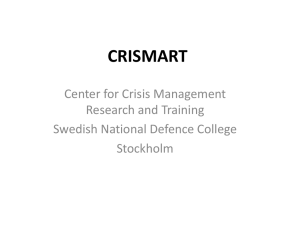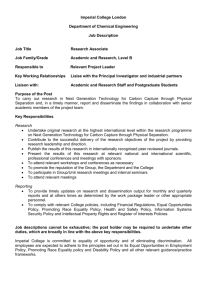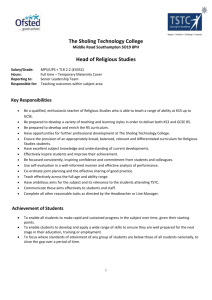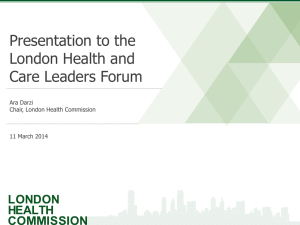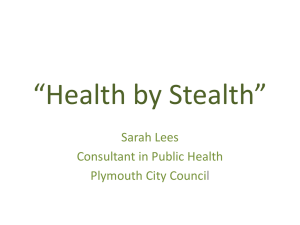Job Description - RCN Bulletin Jobs
advertisement
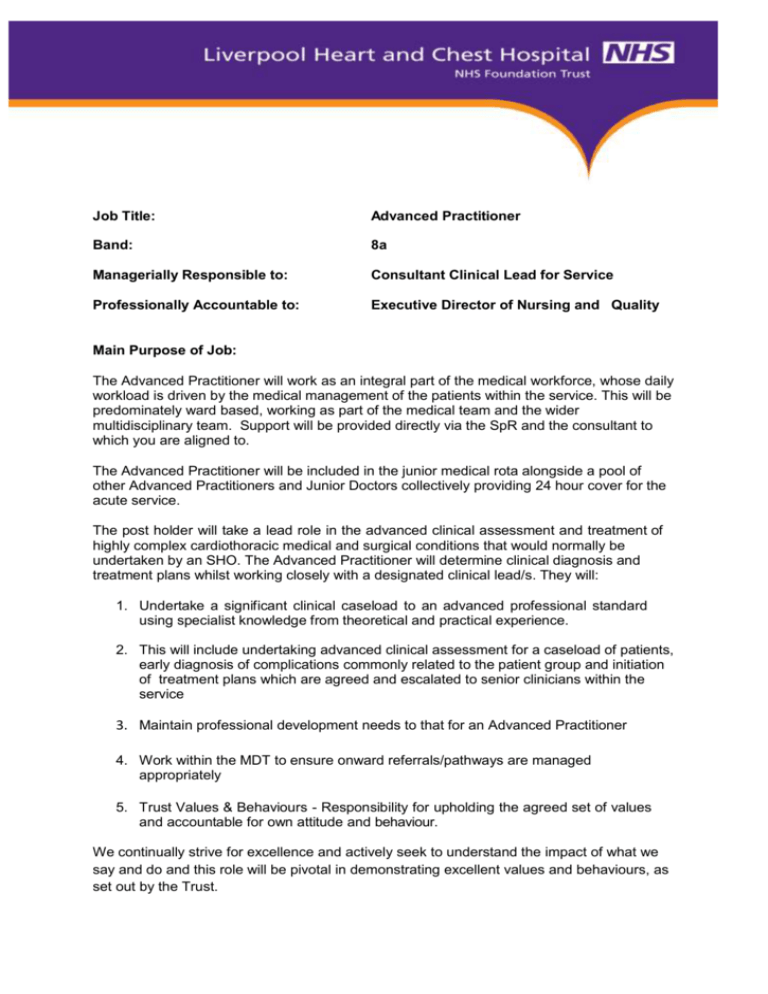
Job Title: Advanced Practitioner Band: 8a Managerially Responsible to: Consultant Clinical Lead for Service Professionally Accountable to: Executive Director of Nursing and Quality Main Purpose of Job: The Advanced Practitioner will work as an integral part of the medical workforce, whose daily workload is driven by the medical management of the patients within the service. This will be predominately ward based, working as part of the medical team and the wider multidisciplinary team. Support will be provided directly via the SpR and the consultant to which you are aligned to. The Advanced Practitioner will be included in the junior medical rota alongside a pool of other Advanced Practitioners and Junior Doctors collectively providing 24 hour cover for the acute service. The post holder will take a lead role in the advanced clinical assessment and treatment of highly complex cardiothoracic medical and surgical conditions that would normally be undertaken by an SHO. The Advanced Practitioner will determine clinical diagnosis and treatment plans whilst working closely with a designated clinical lead/s. They will: 1. Undertake a significant clinical caseload to an advanced professional standard using specialist knowledge from theoretical and practical experience. 2. This will include undertaking advanced clinical assessment for a caseload of patients, early diagnosis of complications commonly related to the patient group and initiation of treatment plans which are agreed and escalated to senior clinicians within the service 3. Maintain professional development needs to that for an Advanced Practitioner 4. Work within the MDT to ensure onward referrals/pathways are managed appropriately 5. Trust Values & Behaviours - Responsibility for upholding the agreed set of values and accountable for own attitude and behaviour. We continually strive for excellence and actively seek to understand the impact of what we say and do and this role will be pivotal in demonstrating excellent values and behaviours, as set out by the Trust. Main Tasks/Overview of Responsibilities 1. Promote, monitor and maintain best practice in health, safety and security 2. Contribute to and lead improvement services 3. Contribute to improving quality of care and services, measured through specific patient outcomes measure… 4. Support equality and value diversity 5. Plan, develop and implement approaches to promote health and wellbeing and prevent adverse effects on health and wellbeing Responsibility for Patient & Family Experience and Care (Including monitoring, diagnostics & investigations) 1. Engage in the Trust’s vision of patient and family centered care 2. To be professionally and legally responsible and accountable for all aspects of own work, including the management of patients in your care and to ensure a high standard of clinical care for the patients under your management, and those of other staff, by providing expert care for a caseload of patients. 3. According to current legislation to undertake independent prescribing (And training if required) and also make appropriate use of the administration of medication using Patient Group Directions. Promotion and assessment of health and wellbeing 1. To plan and develop various approaches for health promotion. 2. Work closely with members of the public and users of the service so that health and wellbeing can be promoted effectively. 3. Explain assessment process clearly including the benefits and risks of the assessments undertaken whilst respecting their dignity, wishes and beliefs. Assessment and Treatment Planning 1. Identify and review current information/factors available to determine and plan patient assessment process. 2. Undertake assessment in line with evidence based practice, legislation policies and procedures, e.g. taking case history, examinations, requesting diagnostic 3. investigations. 4. Review and interpret all information available utilising a systematic process of reasoning to make a differential diagnosis. 5. Develop and record a treatment plan consistent with the outcome of assessment and the most probable diagnosis 6. Refer to other practitioners / Clinical Leads as and when necessary. Intervention and Treatment 1. To have the skills required to practice at an advanced level and to use an extended scope of practice beyond own profession (including referral and interpretation of xrays, imaging, pathology reports, suturing, arterial blood gas sampling etc. 2. Identify appropriate interventions/treatments to be undertaken within the context of the overall treatment plan. 3. Undertake intervention/treatments in a manner that is consistent with evidence based practice/clinical guidelines applying own skills, knowledge and experience and using considered judgment to meet individuals complex needs. Initiate appropriate treatment plans that are within agreed parameters. 4. Evaluate the effectiveness necessary modification. of interventions/treatments and makes any 5. To maintain accurate patient notes (electronic) in accordance with Trust and national professional policies and guidelines. 6. Act and escalate patient concerns appropriately and timely to the relevant consultant when required. Personal and People Development 1. To identify own development needs and set own personal development objectives in discussion with his/her reviewer keeping abreast of any new trends and developments and incorporate them as necessary into your work. 2. To take responsibility for own personal development and maintains own PDP supported by …. 3. Makes effective use of learning opportunities whilst contributing to developing the work place as a learning environment. 4. Contributes to the development of others enabling them to develop and apply their knowledge and skills in practice providing timely feedback. Have we previously mentioned this? 5. Generate and share clinical knowledge and expertise with all members of the multi-professional team M.D.T., utilizing any new knowledge feedback to inform and change practice. 6. To be an active member of the continuing education in-house programmes by attendance and presentation at staff meetings, tutorials, training sessions, journal clubs, external courses, clinical supervision and reflective practice and to keep an active portfolio of personal developments. 7. To be involved in the appraisal system of whom, will they have any in line responsibility? 8. To undertake annual mandatory training updates and other relevant courses in line with Trust and local policies. 9. Support the development of a learning organisation alerting managers to resource issues which may affect this. 10. To take shared responsibility for the delivery of training and development programmes for the multi-disciplinary team. 11. Identify and contribute to the ongoing clinical and service developments in order to enhance quality care. Management of People 1. To provide clinical supervision for designated practitioners demonstrating advanced clinical knowledge, judgment and decision making. 2. To participate in the appraisal 3. To identify, report and address poor performance issues. 4. To diffuse challenging behaviour, ensuring that the situation is managed in a sensitive way. 5. To act as a role model providing mentorship and/or clinical supervision to other staff/learners supporting them in applying theory to practice. Responsibilities for Physical and Financial Resources 1. To be responsible for equipment used in carrying out clinical duties, and to adhere to departmental policy, including competence to use equipment and to ensure the safe use of equipment by others through teaching, training and supervision of practice. Communications and Leadership 1. To communicate effectively with a wide range of people in a manner consistent with their level of understanding, culture and background and preferred ways of understanding communication skills of persuasion, motivation, explanation and gaining informed consent with be used with a wide variety of patients. Barriers of effective communication will regularly be evident, e.g. altered conscious level, sensory loss, altered perception, pain, fear and severe psychosocial problems. 2. To assess capacity, gain valid informed consent and have the ability to work within a legal framework with patients who lack capacity to consent to treatment. 3. To explore complex issues and to make complex decisions encouraging the effective participation of all involved. 4. To be empathetic and reassuring when communicating highly sensitive condition related information and advice to patients, carers and relatives. 5. To competently receive highly sensitive information concerning patients medical condition. 6. To use a range of skills to adapt the delivery of information through changing the environment, methods of communication or delivery of content using persuasive, reassuring skills as required. E.g. breaking bad news/special needs/dealing with anxious relatives. 7. To provide spontaneous and planned advice, teaching and instruction to relatives, carers’ and other professionals, to promote understanding of the patient’s condition/conditions and to ensure a consistent approach to patient care.8. To maintain comprehensive and accurate assessment and treatment records in line with legal and directorate requirements, and communicate assessment and treatment results to the appropriate disciplines in the form of letters and reports. 8. Ensure that all aspects of safeguarding, vulnerable adults, children and patients with learning disabilities are managed appropriately and escalated in accordance with Trust policy. MCA and DOLS to be considered in line with patient need. Leadership 1. To inspire others and encourage them to seek advice and solutions to problems. 2. To challenge others to take an active part in developing knowledge, ideas and work practice. 3. To promote the service and disseminate good practice both internal and external to the Trust. Planning and Organising 1. To accept clinical responsibility for a diverse and often complex caseload of patients, and to organise this efficiently and effectively with regard to clinical priorities and use of time. 2. To decide priorities for own work area, balancing other patient related and Professional demands, and ensures that these remain in accordance with those of the service as a whole. 3. To demonstrate a sound understanding of Governance and Risk Management and apply to work situation. 4. To attend staff meetings and participate in discussions concerning the running of the service. 5. To actively contribute to and support agreed developments and directorate/Trust objectives. Partnership Working/Service Development 1. To accept referrals from other health care professionals and have the ability to refer patients directly to other specialties’. 2. To communicate effectively and work collaboratively with medical, nursing and therapy colleagues to ensure delivery of a co-coordinated multidisciplinary service. 3. To work both as an individual and across the team to ensure that policies, strategies and service development enhance care delivery. 4. To adhere to Trust Policies, procedures and current legislation which relate to own workplace and contribute to service development. 5. To develop clinical protocols, standards and guidelines in own area. 6. To evaluate with others, the effectiveness of any changes and how these have improved services, e.g. benchmarking services. 7. To propose policy or service changes which impact beyond own area of activity. 8. To participate in local/regional groups related to own area. Research, Audit and Analysis of Data Quality 1. To act as a role model ensuring own actions promote quality and identify and manage risks. 2. To keep up to date and act consistently with quality standards and guidelines within their own clinical area and associated responsibilities. 3. To alert others to new developments and lead them in understanding how their practice should change to improve quality. 4. To assess and monitor the quality of work in own area 5. To raise quality issues and related risks with relevant people and follow this up and address poor performance as per Trust policy e.g. complaints, incidents and poor communication. 6. To inform and influence Governance issues. 7. To informally and formally network and share achievements. 8. To undertake the measurement and evaluation of your work and current practices through the use of Evidence Based Practice projects, audit and outcome measures, and lead others in doing so. Make recommendations for and lead change. 9. To keep up to date with developments within your own specialised field, disseminate information, and ensure that practice is based on best available evidence. 10. To demonstrate involvement/utilise research. 11. To facilitate the process of audit and analysis of data to make sense of emerging patterns Equality and Diversity 1. To recognise and promote the importance of people’s rights and interpret them in a way that is consistent with Trust procedures, policies and legislation. 2. Acts in a way that acknowledges and recognises people’s expressed beliefs preferences and choices (e.g. how people like to be addressed and spoken to). 3. Respects people’s diversity and values them as individuals. 4. To challenge behaviour that undermines the rights of others 5. To identify and take action where necessary to address discrimination. Health and Safety 1. Be aware of the Health and Safety aspects of your work and implement any policies which may be required to improve the safety of your work area, including the prompt recording and reporting of accidents to senior staff and ensuring that equipment used is safe. 2. To comply with the organisational and departmental policies and procedures and to be involved in the reviewing and updating as appropriate. 3. You are accountable for the effective deployment of activities that ensure that your department/ward/clinical team is reducing hospital acquired infection. You will ensure that you and your staff comply with the Trust’s policies on infection, prevention and control. You will ensure that you and your staff receive the training required to maintain competence to execute the Trusts policies on infection, prevention and control. You have a responsibility to bring deficiencies in the deployment of such policies to the attention of your line manager. Making Every Contact Count 1. Front line staff are in an ideal position to offer support and advice on how to improve health and wellbeing. 2. Staff should use their interactions with the public to give them additional advice on health and wellbeing 3. Staff will be given training and support to help them to signpost people to other services which may improve their health and wellbeing. Freedom to Act 1. To work as an autonomous practitioner in line with the code of conduct and standards of practice having regard to the NMC “Code of Professional Conduct” for the nurse, midwife and health visitor and their professional contribution to clinical governance. 2. Not directly supervised. 3. Is guided by Trust protocols and codes of conduct interpreting national guidelines and policies applicable to won sphere of autonomous practice. In order to work within the Trust Clinical Governance Framework, which includes CNST Standards accreditation, you must be fully competent and trained to undertake the tasks allocated to you. To practice competently, you must possess the knowledge, skills and abilities required for lawful, safe and effective practice without direct supervision. You must acknowledge the limits of your professional competence and only undertake practice and accept responsibilities for those activities in which you are competent. This includes use of medical equipment. Due to the Trust’s commitment to continuous improvement, it is likely that the post will evolve over time. These duties will be subject to regular appraisal and any amendments will be made in consultation and agreement with the postholder Essential Desirable Assessment method Person Specification Registration Essential Current NMC registration first level nurse essential Clinical based Masters Degree Evidence of extensive expert professional/clinical knowledge within an acute clinical setting Non-Medical Prescriber Evidence of involvement in the development of programmes of care, protocols and clinical audit Effective communicator able to communicate complex and highly sensitive information Evidence of effective people management and leadership skills Evidence of relevant involvement in meeting the Trust clinical governance objectives Computer Literacy Desirable Post basic qualification in speciality Clinical experience within the acute cardiothoracic setting Evidence of involvement in policy and practice change Evidence of proactive involvement in mentorship and development of clinical practitioners Knowledge, Skills and Experience Demonstrates specialist expertise underpinned by theory acquired through CPD Highly developed effective communication/negotiation skills Excellent clinical reasoning / clinical decision making Evidence of involvement and leadership in teaching and mentoring learners
